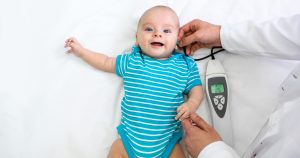Why is newborn hearing screening important? Even mild hearing impairment can affect the social, emotional and cognitive development of your child.
Early Intervention Is Key
Having your young child screened for hearing is critical. This first step will identify those babies that need early intervention and support since the first few years of life are important for language skills even for those with mild hearing loss.

All babies are given a quick non-invasive hearing screening shortly after birth. It is standard of care in most US hospitals. Since hearing loss affects 1 to 3 children per 1,000 newborns, that equates to approximately 6,000 babies whose hearing falls outside the normal range. These early screenings are a way to alert parents to progressive problems
If your child is not screened before leaving the hospital, have your pediatrician perform the test before the baby reaches one month.
Two Types of Newborn Screening Tests
Your baby should be resting and calm or asleep for both of these tests.
Otoacoustic Emissions Test (OAE)
OAE evaluates whether certain areas of the ear react to sound. A soft, gentle earphone is placed inside the baby’s ear canal, which generates sounds and detects an “echo” response. This happens when hearing is normal. If no echo is detected, the baby could have hearing loss.
The Auditory BrainStem Response (ABR)
ABR evaluates how the auditory nerves and brainstem respond to sound. The brainstem carries sound from the ear to the brain. The baby will wear tiny earphones and have painless electrodes placed on the head.
If these test results find your child may have a hearing loss, schedule an appointment as soon as possible with an experienced pediatric hearing specialist like Hearts for Hearing to determine if your baby has a hearing problem, and if that’s the case, the type and extent of the problem.
Monitoring Childhood Hearing Changes
The American Academy of Pediatrics recommends that young children be screened again as follows:
- Yearly screening for children ages 4 through 6
- Screening at age 8 and age 10
- Adolescents should also receive at least 3 screenings to discover any changes that may affect language and learning
As Your Child Grows
If the tests conclude your child has normal hearing, it is still important to monitor your child at home and continue screening at the appropriate age levels.
As your child grows, hearing changes can be gradual and subtle. Certain occurrences can lead to changes in their hearing. Hearing can change due to frequent ear infections, being infected with measles or meningitis, a head injury, being exposed to loud noises, and even secondhand smoke.
Watch for these signs and notice these behaviors:
- Does not respond when called if they are in another room
- Doesn’t turn toward sounds or startle with loud noises
- Does not show enjoyment or interest when you read to them
- Wants the TV or music turned louder than the rest of the family
- Doesn’t notice you until they can see you
- Hasn’t said single words like dada or mama by the time they reach 12 to 15 months.
Newborn Hearing Specialist in OKC and Tulsa
Continue to monitor your child’s hearing. If you notice any changes in their ability to decipher sounds or if they appear to have a hearing loss, contact Hearts for Hearing at 405–548–4300 to schedule an appointment.
